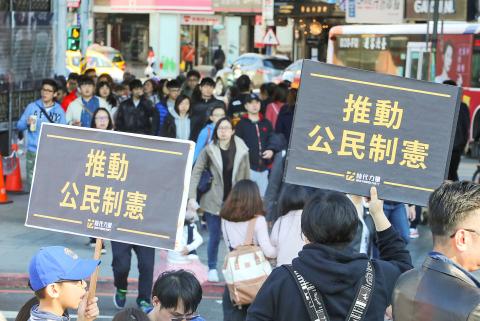The New Power Party (NPP) yesterday began a referendum drive to scrap newly approved amendments to the Labor Standards Act (勞動基準法), legislate for a minimum wage bill and require the president to call a national affairs conference to draft a new constitution.
The party is waging a campaign on the streets for three separate referendum topics: requiring the legislature to scrap the labor amendments approved on Wednesday last week and restart the legislation process; establishing a minimum wage law stipulating a salary that can sustain basic living needs; and requiring the president to convene a national affairs conference to formulate a new constitution, which would subsequently require referendum approval.
Following the passage of the labor amendment, the NPP on Friday last week announced that it was adding the labor referendum petition to its referendum drive on a living wage and a new constitution.

Photo: CNA
In a week, the party plans to collect 1,879 signatures — about 0.001 percent of the voter turnout in the last presidential election — for each referendum topic and submit them to the Central Election Commission, before collecting 280,000 signatures — about 1.5 percent of the eligible voters in the most recent presidential election — for each topic in the coming months to initiate the referendum.
“The amendments approved by the Legislative Yuan are worse than the Cabinet proposals. [The Cabinet] said its proposals were to allow workers to work overtime to improve low wage conditions,” NPP Executive Chairman Huang Kuo-chang (黃國昌) said. “The claim is unacceptable, but even more unacceptable is the final version approved by the Legislative Yuan, which will allow [employers] to give compensatory leave in lieu of overtime pay.”
The public should join the referendum drive to abolish the labor amendments and improve working conditions, Huang said.
Asked if the party would stick to the set of “expedient” labor amendments that it proposed on Monday last week, which has a striking resemblance to the Cabinet amendments should the labor law referendum be approved, NPP Legislator Hsu Yung-ming (徐永明) said the party was still undecided.
The party plans to assess public opinion during the course of the referendum and propose bills accordingly, Hsu said.
The NPP in April 2016 proposed a draft minimum wage bill, which stipulated a minimum monthly salary of NT$26,867, but the bill has been shelved without undergoing any review, Huang added, calling for a minimum wage act to protect labor rights.
Meanwhile, Huang and Hsu denied a media report alleging that a division had sprung up among NPP lawmakers over the referendum drive, as “dovish” NPP lawmakers Hung Tzu-yung (洪慈庸), Freddy Lim (林昶佐) and Kawlo Iyun Pacidal were reportedly against the labor law referendum proposal.
They were absent from yesterday’s campaigning.
Hsu said the lawmakers’ absence was due to scheduling conflicts and added that the labor law referendum proposal was approved by the NPP’s decisionmaking body.
Meanwhile, the party plans to put forward a list of 20 councilor candidates as the first series of its nominations for the year-end mayoral and councilor elections.

An essay competition jointly organized by a local writing society and a publisher affiliated with the Chinese Communist Party (CCP) might have contravened the Act Governing Relations Between the People of the Taiwan Area and the Mainland Area (臺灣地區與大陸地區人民關係條例), the Mainland Affairs Council (MAC) said on Thursday. “In this case, the partner organization is clearly an agency under the CCP’s Fujian Provincial Committee,” MAC Deputy Minister and spokesperson Liang Wen-chieh (梁文傑) said at a news briefing in Taipei. “It also involves bringing Taiwanese students to China with all-expenses-paid arrangements to attend award ceremonies and camps,” Liang said. Those two “characteristics” are typically sufficient

A magnitude 5.9 earthquake that struck about 33km off the coast of Hualien City was the "main shock" in a series of quakes in the area, with aftershocks expected over the next three days, the Central Weather Administration (CWA) said yesterday. Prior to the magnitude 5.9 quake shaking most of Taiwan at 6:53pm yesterday, six other earthquakes stronger than a magnitude of 4, starting with a magnitude 5.5 quake at 6:09pm, occurred in the area. CWA Seismological Center Director Wu Chien-fu (吳健富) confirmed that the quakes were all part of the same series and that the magnitude 5.5 temblor was

The brilliant blue waters, thick foliage and bucolic atmosphere on this seemingly idyllic archipelago deep in the Pacific Ocean belie the key role it now plays in a titanic geopolitical struggle. Palau is again on the front line as China, and the US and its allies prepare their forces in an intensifying contest for control over the Asia-Pacific region. The democratic nation of just 17,000 people hosts US-controlled airstrips and soon-to-be-completed radar installations that the US military describes as “critical” to monitoring vast swathes of water and airspace. It is also a key piece of the second island chain, a string of

The Central Weather Administration has issued a heat alert for southeastern Taiwan, warning of temperatures as high as 36°C today, while alerting some coastal areas of strong winds later in the day. Kaohsiung’s Neimen District (內門) and Pingtung County’s Neipu Township (內埔) are under an orange heat alert, which warns of temperatures as high as 36°C for three consecutive days, the CWA said, citing southwest winds. The heat would also extend to Tainan’s Nansi (楠西) and Yujing (玉井) districts, as well as Pingtung’s Gaoshu (高樹), Yanpu (鹽埔) and Majia (瑪家) townships, it said, forecasting highs of up to 36°C in those areas